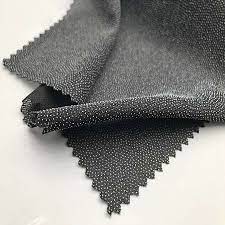Fusible Interlining Suppliers
-

When it comes to sourcing fusible interlining for your textile projects, partnering with a reliable supplier is crucial. The right supplier can provide high-quality interlining products that enhance the stability, structure, and appearance of your textiles. In this blog post, we will present a comprehensive guide to the top fusible interlining suppliers in the industry. By exploring their product range, quality standards, customization options, and other factors, you can make an informed decision and choose the perfect supplier for your specific requirements.
Understanding Fusible Interlining
Fusible interlining is a textile component used to reinforce and stabilize fabrics. It is typically made of woven, non-woven, or knitted materials and is coated with a thermoplastic adhesive on one side. When exposed to heat and pressure, the adhesive activates, allowing the interlining to bond with the fabric.
Versatility and Applications
Fusible interlining finds applications in a wide range of textile products. From garments like shirts, blouses, and dresses to home textiles such as curtains, linens, and upholstery, interlining enhances the appearance, drape, and durability of these items. Additionally, interlining is used in accessories like bags, hats, and belts, where structure and stability are key.
Benefits of Fusible Interlining
1.) Enhanced Structure and Stability: The adhesive properties of fusible interlining reinforce fabrics, providing stability and preventing stretching or sagging. This ensures that the finished products maintain their shape, even after prolonged use and washing.
2.) Improved Appearance: By adding body and fullness to fabrics, fusible interlining enhances the overall appearance of garments and home textiles. It helps create clean lines, smooth curves, and sharp edges, contributing to a polished and professional look.
3.) Ease of Sewing: Fusible interlining simplifies the sewing process by reducing the need for excessive stitching or handwork. It helps fabrics stay in place during sewing and prevents seam puckering, making it an invaluable tool for both professionals and hobbyists.
4.) Time and Cost Efficiency: Using fusible interlining can significantly reduce production time and costs. The simplified sewing process and improved efficiency result in faster turnaround times and increased productivity.
Quality Considerations
Selecting the right fusible interlining is crucial to achieving optimal results. Here are some key factors to consider when choosing a supplier.
1.) Adhesive Quality: A reliable supplier will ensure that the adhesive used in their interlining is of high quality, providing a strong and durable bond without compromising the fabric's integrity.
2.) Compatibility: It is important to select an interlining that is compatible with the fabric type and weight to ensure optimal bonding and desired results.
3.) Washability and Durability: The interlining should maintain its performance even after repeated washing or dry cleaning, without losing its bonding properties or affecting the fabric's appearance.
4.) Environmental Considerations: Look for suppliers who prioritize sustainability and offer environmentally friendly interlining options, such as those made from recycled or biodegradable materials.
Choosing a Reliable Fusible Interlining Supplier
To ensure a successful textile project, it is crucial to partner with a trustworthy supplier. Consider the following factors when selecting a supplier.
1.) Experience and Expertise: Look for a supplier with a solid reputation and extensive experience in the industry. Their knowledge and expertise will help you make informed decisions and provide valuable guidance throughout your project.
2.) Product Range and Customization: A reliable supplier should offer a diverse range of interlining options to cater to different fabric types, weights, and project requirements. Customization services allow you to meet specific needs and create unique textile products.
3.) Quality Assurance: Choose a supplier who adheres to strict quality control measures, ensuring consistent product performance and reliability.
4.) Timely Delivery and Customer Support: Efficient logistics and responsive customer support are essential for a smooth and hassle-free collaboration. Ensure that your supplier can meet your delivery deadlines and provide assistance whenever needed.